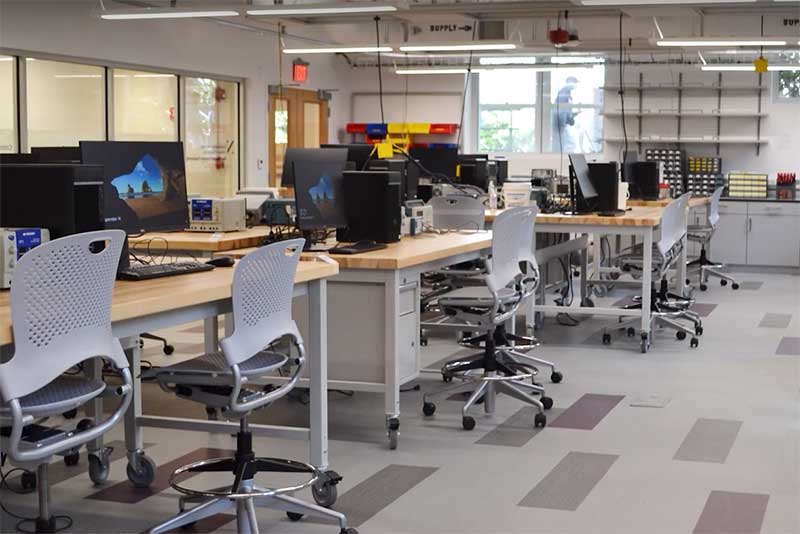Undergraduate Studies
Electrical and computer engineering isn’t just about electricity and programming. Yes, we do those things, but they are only parts of our field. Our discipline has three technical foundations: physics (encompassing circuits, semiconductor devices, electromagnetic and optical systems), computers (including microprocessors and computing devices), and Math (dealing with information, networks, and systems). Electrical and computer engineers design solar-power systems, communication networks, radars, lasers, robots, medical devices, personal electronics, high-performance computers, machine-learning systems, quantum computers and more.
Successful engineers need to organize and adapt information to solve problems. They also must work effectively in teams and communicate well. Therefore, the goal of the electrical engineering and computer engineering programs is to help students develop these skills and provide the appropriate technical background for a successful career.
Program Flexibility
The Bachelor of Science programs allow students sufficient flexibility within the standard eight academic semesters to earn a minor in nearly any department in the university. Typical minors might include physics, math, computer science, or business, but students might also organize their course of study to earn a minor in economics, English, or music. Accelerated master’s programs are also available.
Extensive Lab Facilities
The academic program is supported by extensive laboratory facilities for study and experimentation in computing, circuit analysis, electronics, digital systems, microwaves, control systems, semiconductor processing, very large-scale integration (VLSI) design, and digital signal processing. Students have access to state-of-the-art computing facilities, including numerous Linux and Windows-based workstations. Many courses are taught in one of the four computer-based teaching classrooms. Two introductory electrical and computer engineering courses meet in integrated lab-classrooms where students and professors, assisted by undergraduate and graduate teaching assistants, work together on both theoretical and practical aspects of a wide range of signal processing and computing systems.
Cooperative Education
More than 90 percent of department undergraduates take advantage of the cooperative education program. During the cooperative work phase of the program, the students’ levels of responsibility grow as they gain theoretical and technical knowledge through academic work. A sophomore might begin cooperative work experience as an engineering assistant and progress by the senior year to a position with responsibilities similar to those of entry-level engineers.
Research Experiences
The department also offers significant research opportunities throughout all fields of electrical and computer engineering, including participating in research centers based in our department and college.
Capstone Project
A senior-year design (two-semester) course caps the education by drawing on everything learned previously. Teams of students propose, design, and build a functioning electrical or computer engineering system—just as they might in actual practice.
Prepared for the Future
An ECE education prepares students for any technical career, a career in a related field, or graduate study. ECE is one of the highest paid degrees. Students will learn not only the current practice of the field, but also techniques for future learning that will enable them to have a lifelong career in our rapidly changing discipline.
More Information
Undergraduate education at Northeastern’s College of Engineering offers ongoing support and resources as well as innovative programs such as our world-renowned cooperative education program and opportunities for entrepreneurship and business.
